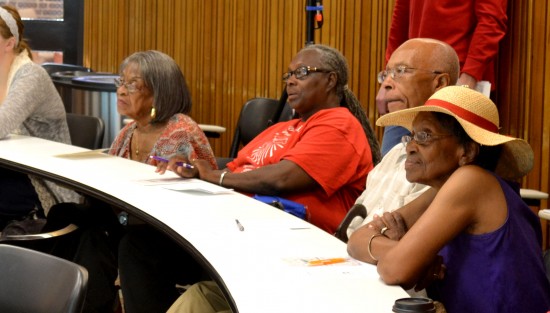
Joseph and Dorothea Jenkins (right) listen as Penn Memory Center intern Tobi Akindoju presents the results of his research at the University of Pennsylvania last summer.
Joseph Jenkins was skeptical when he heard the Penn Memory Center was conducting research in his neighborhood.
A retired SEPTA employee living in West Philadelphia, he had spent his fair share of time participating in other organizations’ surveys and questionnaires about his community without ever seeing a result.
There was the bus station shelter he wanted to see installed on a nearby street corner.
No action.
Then there was that meeting at White Rock Baptist Church, where city officials made promise after promise about other improvements to the city.
No action.
“They never do anything,” he said. “Every time we have a meeting like this, nothing ever happens.”
His wife, Dorothea, felt the same skepticism, recalling a number of hospital visits.
“Everyone’s coming this way and that way, asking questions and not giving answers,” she said. “It gets so frustrating.”
But this time, the participation call came from Elsie Shelton, leader of the First Corinthian Baptist Church Community Center. And as Dorothea Jenkins said, they would do “anything for First Corinthian,” including participate in yet another focus group.
Creating An Age-Friendly Community
The focus group was led by Tobi Akindoju, a rising senior majoring in economics at Yale University who was spending his summer interning with the Penn Memory Center. He worked closely with Tigist Hailu, coordinator for diversity in research and education.
Their goal was to determine whether the area surrounding First Corinthian was an age-friendly community and, if not, what steps would need to be taken. An elderly person’s cognitive health is largely dependent on his or her environment, so improvements would be helpful for the collective cognition in addition to the community.
Eleven First Corinthian members joined the focus group, telling Akindoju and Hailu the hurdles they noticed in their daily lives, especially regarding crime and age-friendly transportation options.
“Older citizens in the neighborhood want to see change in their living environments,” Akindoju said. “All that is needed is an investment on the part of the city to make this area more age-friendly.”
He found that few options for healthy eating, medical care, and exercise could be found within a walking distance of the church, and uneven sidewalks posed a risk for seniors who dared to travel on foot. Transportation was often not available to these seniors either, making it “arguably the most significant problem,” he said.
Focus group participants were concerned with their safety in the region, especially in public parks like Malcolm X, located across the street from First Corinthian.
“The park is not appealing to me,” one participant is quoted as saying. “There are some services, but for me to go over there and sit, no way, I would have to have a rifle with me.”
’This is gonna do something.’
At the end of the summer, Akindoju presented his findings to an audience of his peers on the Penn campus. In attendance were four members of the First Corinthian focus group, including Joseph and Dorothea Jenkins, who listened closely as Akindoju outlined the problems they had discussed and proposed a plan of action to tackle each one.
During his presentation, Akindoju made recommendations to the City of Philadelphia regarding the First Corinthian community, including:
• Increasing park use by older adults by decreasing crime, reducing clutter
• Increasing number of fresh food options and providing seniors with transportation (either public or through ride-sharing technology like Uber and Lyft)
• Increasing the number of bus stops and shaded bench areas
“When this happened,” Joseph Jenkins said, “I said, ‘wow, this is gonna do something.’”
Akindoju has completed his internship, but the Penn Memory Center is continuing to work to turn his research and recommendations into measurable results for the First Corinthian community.
Plenty of work is still ahead before the neighborhood can be called an “age-friendly community,” but Joseph Jenkins pointed out that the Penn Memory Center’s efforts and continued communication make the difference.
“Maybe you don’t get something done, but if you keep coming back and telling us this, and come back here and see this, I’m fine with that,” he said.
But, his wife notes, “we want to get something done, at least.”